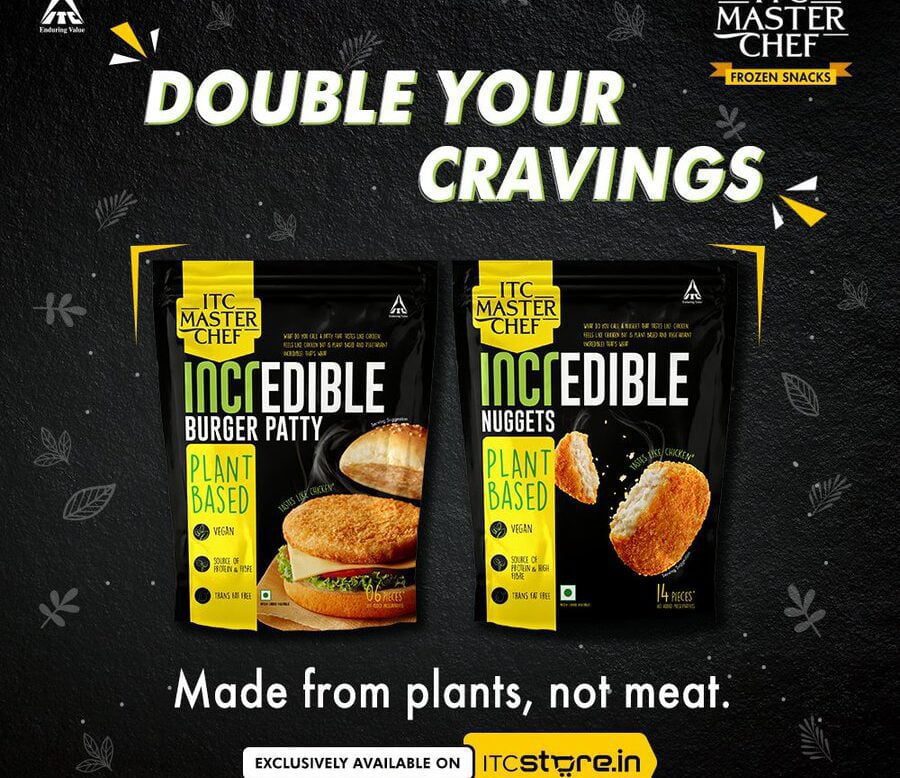Plant-based meat
According to an OECD report published in November, India consumed six million tonnes of meat in 2020, or 4.6 kilograms a person. Nearly half of India’s population now consumes non-vegetarian meals once a week.

However, at the same time, there is growing interest in the country for modern-style plant-based meat products. The market in India is in its very early stages but is seeing expansion. According to Carmen Bryan, a consumer analyst at GlobalData, the meat substitutes market in India generated retail sales of US$220.8m in 2020 and is expected to reach $292.9 million by 2025, clocking a compound annual growth rate (CAGR) of 5.8%.
A number of domestic specialists have carved out a foothold. Udaipur-based GoodDot Enterprises, set up in 2013, has built a nationwide presence for its shelf-stable meat alternatives. Blue Tribe Foods is another, set up in Mumbai in 2020 and offers a range of alternatives to chicken and mutton products. This month, Blue Tribe Foods announced Indian cricket star Virat Kohli and his wife, the actor Anushka Sharma, as investors and brand ambassadors.
There are Indian firms, meanwhile, that are working with foreign players. Imagine Foods, the company behind the Imagine Meats brand promoted by Bollywood actor couple Riteish and Genelia Deshmukh, has partnered with US agri-business major ADM to offer plant-based meat versions of biryani, kebabs and curries to India’s consumers.
And processors of conventional meat are also monitoring the market closely. Some are already doing business. The Allana Group, India’s largest beef exporter, is importing plant-based chicken patties and nuggets into India through a tie-up with US group Beyond Meat.
In May 2021, the US Department of Agriculture published a report that described India as “a burgeoning market for plant-based meat substitutes”. The report said consumers in India have a long history of consuming soybeans, jackfruit, dairy, and pulses for protein and added they view plant-based meat substitutes as “highly innovative, trendy, healthy and environmentally friendly”.
Shoppers in India, the report suggested, are looking to buy plant-based meat products “due to their perceived health benefits, including the prevention of non-communicable diseases, digestive disorders and obesity”. Covid-19 has also fuelled “the rising popularity” of plant-based meat in India products because they are viewed as “immunity-boosting,” the report noted.
Major domestic food manufacturers are eyeing the market. In January, giant tobacco-to-food conglomerate ITC – best known for household food brands such as Bingo snacks and Aashirvaad kitchen ingredients – unveiled a range of chicken patties and nuggets to be sold under the Incredible brand.
ITC’s move is sure to spur the market, Sriram C Manyam, senior manager for food processing and retail consulting at Sathguru Management Consultants, says. Manyam argues ITC’s existing presence in frozen foods, its ready-to-eat expertise, and its back-end integration, linking farmers and agri-business, will give the group an edge. “The entry of ITC will intensify the competition and level up the game,” he says. “Most early-stage start-ups … will now have to up their stakes in terms of product development and reach.”
India’s market for plant-based meat is in its infancy but investors and entrepreneurs are, in the main, optimistic about the sector’s potential, even if there is some uncertainty about the real extent to which the market can grow.
Devendra Chawla, CEO of the Mumbai-based Spencer’s Retail and Nature’s Basket chains, says meat alternatives remain a very niche segment in India, currently supported primarily by millennial consumers in major cities who are open to exploring new tastes and products. However, Chawla expects the nascent area to also find traction beyond major metropolitan areas as consumers across different age groups adopt new food habits. There is limited awareness of the products at present but digital marketing and social media are helping educate consumers, he adds.
Spencer’s Retail and Nature’s Basket, with 150 and 34 outlets across India respectively, both sell plant-based meat products, stocking lines from companies including Ahimsa Food, Blue Tribe and Imagine Meats.
Chawla argues he would not “be surprised” if India’s smaller “tier two” cities become a huge market for these lines. “With a dense and wider omnichannel promotional pricing assortment, this can just fly and may become a staple diet for many,” he argues.
Sudhish Sukumaran, the head of Imagine Foods, predicts India’s plant-based meat-alternative market across retail and foodservice will generate $500m in annual revenues within the next four years. “We have steered the growth of Imagine Meats to the best level of industry benchmarks in the category and we see us as the category leader in this domain in the next two years,” Sukumaran insists.
But what must manufacturers do to grow sales in this receptive market? At Sathguru Management Consultants, Manyam has a note of caution about the make-up of the products on sale in India. “The level of technology adoption and the underlying science behind plant-based foods in India is very nascent in India,” he says. Companies are focusing on product formats mimicking the texture and product form of meat but few businesses are focusing on underlying tech, such as protein chemistry and advanced processing, including high-moisture extrusion, Manyam explains. A lack of skilled technical manpower in India, particularly in the chemistry and processing of food proteins, is, for the time being, a “limiting factor” for growth.
Taste, of course, will be vital. It is a critical component for manufacturers in any emerging category that want to build a sustainable market.
Like China, India has a history of its own type of meat-alternative products, with a number of domestic businesses offering soy chunks and soy nuggets for decades but without, it’s said, really building demand and a market.
In India, there is added complexity due to the size of the country and the importance of local cuisines. Taste preferences can vary in every state. In the northern city of Lucknow, consumers can favour the subtlety of galouti kebabs, whereas complex chicken chettinad is preferred in much of southern India. “It is of paramount importance that the product is able to fit into this puzzle,” Chawla says.
Urban Platter is an online gourmet food store launched by co-founders Dhaval and Chirag Kenia, which sells Beyond Meat products in addition to its own brand of plant-based meats. Chirag Kenia, Urban Platter’s CEO, says India’s government could support the growth of the fledgling market. Regulations and subsidised industry infrastructure could accelerate production, scaling up towards mass production that delivers affordable products, he argued, with the establishment of cold chain-infrastructure that aids manufacturers important to help smaller businesses flourish and innovate.
Sohil Wazir, the chief commercial officer at Blue Tribe Foods, says: “Innovation has to happen across the value chain, from the ingredients used, processing technology, packaging and even supply chain, for this category to grow. Concentrated effort is required to develop this category, not just by the private players but by the authorities, who can influence taxation, [and hence] resource allocation in a positive manner.”
While affluent, millennial consumers in India’s major cities may be seen as a driver of the niche in the short term, the country remains a price-sensitive market. For many, meat can often be seen as an aspirational product. There could be the perception among some consumers that a meat substitute should be priced below the conventional product. “The right pricing of products will be the key to growth of the category,” Harish Jadwani, the owner of New Delhi-based Ahimsa Food, says.
There is growing interest in identifying the emerging markets that could present lucrative opportunities for plant-based meat manufacturers. The size of the potential prize in India means the country is attracting attention and investment is increasing but companies looking to build businesses should realise much work lies ahead and, even then, a market may not form to rank alongside those in more developed economies.








